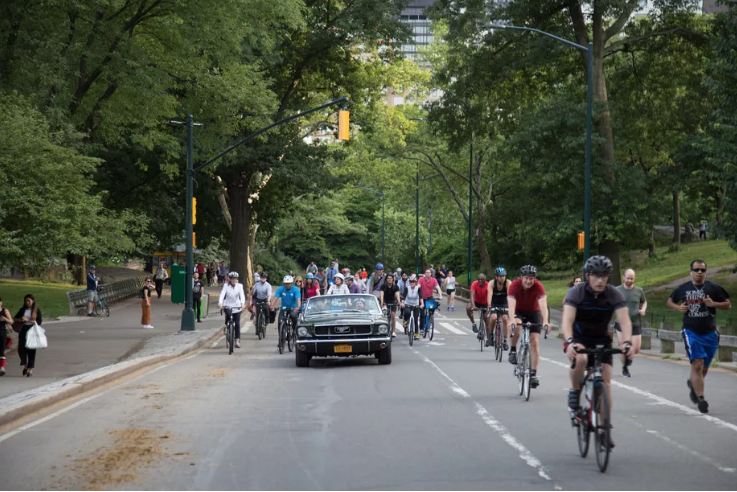Curbed, October 2018
Interview: Paul Steely White says goodbye to Transportation Alternatives
Reflections on 15 years leading the safe streets advocacy group
After 15 years as the executive director of Transportation Alternatives, Paul Steely White has become synonymous with the rabble-rousing safe-streets organization, and had a hand in some of its most successful campaigns—from the launch of Citi Bike to the implementation of car-free Central and Prospect Parks to leading the Vision Zero charge in the city.
But now, with that decade-plus of organizing under his belt, White is moving on: Transportation Alternatives announced today that White will be going to Bird, the e-scooter company making inroads in New York City, to serve as its Director of Safety and Advocacy.
Curbed spoke with White—who says this move is a natural next step to try to implement more of what he called “human-scale” transportation—about his legacy at TransAlt (besides being the man who wore a helmet as he drove the last private car on Central Park’s main loop), as well as the next frontier in fighting the supremacy of the car.
When asked about TransAlt’s greatest accomplishment during his time there, White—who led the organization through two mayors, three DOT Commissioners, and major growth spurts—said that “[Transportation Alternatives] succeeded in and [has] reoriented the role of the automobile in the city. We’ve made human-scale and humane transportation policies the new orthodoxy.” When viewed through the lens of this past summer’s outcomes on both the extremely contentious Skillman Avenue bike lane and the gubernatorial intervention to restart the city’s speed camera program, that’s a hard idea to refute.
Crediting organizing from TransAlt’s membership and affiliated groups like Families for Safe Streets, White says that those 15 years also have led to a point “where we’ve achieved a real systemic transformation in how city streets and design are managed.” And even if he won’t be figuring those things out with activists anymore, he believes those activists “will be more relevant and more at the table and in the room more than ever because they were first to market with these ideas.”
As for that future in the Disruptoverse, White believes the e-scooter wave is part of a larger demand for mainstream acceptance of transportation options like smaller electric vehicles. “The common cause that cyclists, walkers and new forms of small mobility have [means] there’s clearly a big-tent moment,” he explains, “where there’s an opportunity to organize all these smart alternatives to cars into a more unified political force for change.”
Part of the appeal, for White, also stems from Bird CEO Travis VanderZanden’s willingness to discuss reducing the car’s primacy over city streets. VanderZanden repeatedly talked about taking cars off the road in one interview this year, has called automobiles “dockless cars,” and has said that “it’s the right solution to get people out of cars.”
But even as White joins the world of Silicon Valley, he says he’s not signing on to the electric car future envisioned by other scooter investors like Uber and Lyft. “There’s this view that cars, pedestrians, transit, bikes, scooters can all live in harmony on one app to rule them all—I am not sure I buy that,” he says. “A street hospitable to robocars is probably not a street you want to hang out or travel on as a walker, biker, [or] scooter rider. The problem we should all be solving for is how to make all forms of pedestrian mobility as safe and easy as possible, not how do we contort our streets and ourselves around ’smart’ cars’.”
As for the future of Transportation Alternatives itself, White says, “I don’t think my leaving the organization really has relevance in terms of an ebbing or flowing of the advocates, and has more to do with where I am in my personal trajectory.” (TransAlt’s COO Ellen McDermott and legislative and legal director Maro Conner will be helming the group while the search for a new executive director goes on.)
And its next big fight is one that transit advocates are already quite familiar with: congestion pricing. “Our mission has never been more relevant to the quality of life in the city, and to the challenges that are facing New Yorkers right now with the deterioration of our transit system,” White says.
Even as congestion pricing has gained more mainstream acceptance up to and including Gov. Andrew Cuomo, White believes implementing it will be a major battle. “Even where we’ve succeeded in changing the culture of our streets, there are still plenty of New Yorkers who see streets as places for cars, places to move and store motor vehicles,” he notes. “The primacy of the car is still there in the minds of many people who matter in New York City.”
Still, White believes a less car-dominated city is on the way. Crediting, for instance, a municipal liability case that held the New York’s street design was in part responsible for a crash that injured a 12-year-old boy, as well as increasing amounts of data showing how safety-focused street redesigns save lives, White says the question of how to make safer streets will move even further out of the political realm.
“It’s not so different from the time when cholera was rampant. Once it became clear how updated designs of urban water and sewage systems could prevent it, the choice was obvious,” he explains. “Unbridled car and truck traffic is a pathogen to everyone else in the street. Now, we know how to use design to insulate against this threat and the time is close when these designs are considered requisite safety engineering, not optional amenities to be kicked around by petty local power brokers.”

